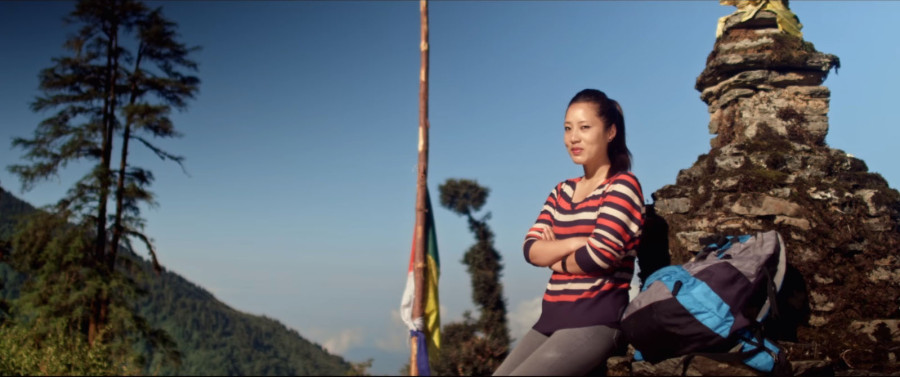Miscellaneous
Free of superstars, melodrama and item numbers, Katha ’72 takes the audience on a personal journey of self-discovery
Nepali filmmakers and their audiences have been feeding off the Indian film industry for quite some time. We have been inspired by everything, right and wrong, our neighbours have offered.
Abhimanyu Dixit
Nepali filmmakers and their audiences have been feeding off the Indian film industry for quite some time. We have been inspired by everything, right and wrong, our neighbours have offered. So inspired, audiences today seem to prefer watching films online for free and for the few who still go to the cinema, it’s either because of the ‘star-power’ of the film’s actor, or for a ‘trending’ sing-along song. This has led filmmakers to produce even more brightly-lit sets and spend lakhs on a single earworm ‘item-number’ because that’s what rakes in the money. This has led to a vicious cycle of mindless content leading to more money and in turn, more mindless content.
The film-watching audience consumes these regularly served-up pleasure packets without question, returning the producers’ investments, but because this now feels like a fool-proof formula, filmmakers seem to shy away from any form of experimentation or self expression. Why risk the profit? Consequently, most films released in the digital era have started to look and feel the same. All the actors play similar characters, they look and dress the same, they have similar obstacles to get over. Any deviation from this standard formula, even by a little bit, gets the film dubbed ‘non-mainstream’; if the film deviates even more, it turns into an independent film.
If that’s the criteria then Katha ‘72 is purely an independent film. Firstly, the film is devoid of any ‘superstars’. Aakash Magar, who plays the lead Palden, has never been seen romancing another beautiful actor and therefore, is not well known. Neither is Supriya Magar, who plays Kesang, or Bhuisal Lama, who plays Palden’s mother Sunmaya. The lead actors all come from theatre, and one look at any promotional posters for plays will show that that’s one stage where they still value content.
Katha ‘72 is not a small dose of entertainment—it is a slow but enriching journey that will compel you to sit through to the end. We meet Palden and his mother Sunmaya immediately after the 2015 (2072 BS) earthquake. Like many who lost their homes in the devastation, they live in a makeshift shelter made of tin. Sunmaya has broken her leg in the earthquake and this is a big inconvenience for the agile person that she is. She desires to go on pilgrimage to Paanch Pokhari in Sindhupalchowk, but the broken leg prevents any long journeys on foot.
Kesang and Palden were once engaged but never got married, so when we meet her for the first time, she has begun to develop stronger feelings for her former fiancée and is on a personal mission to regain Palden’s respect and love. Once Sunmaya’s cast comes off, director Prabin Syangbo takes us on a journey to Paanch Pokhari, which becomes a journey of self discovery for Palden and his evolving relationship with Sunmaya and Kesang.
 Written by Syangbo himself, the characters in Katha ‘72 do not indulge in self-pity; rather, they are filled with purpose to live and move ahead. Their emotions are tangible enough to be felt by the audience; there is no need to read it on the actors’ faces. Much like real life, the only melodrama consists of outbursts of frustration and anger. Syangbo’s actors deliver lines that are calm, short and impactful, very different from the volume that is so evident on the Nepali screen.
Written by Syangbo himself, the characters in Katha ‘72 do not indulge in self-pity; rather, they are filled with purpose to live and move ahead. Their emotions are tangible enough to be felt by the audience; there is no need to read it on the actors’ faces. Much like real life, the only melodrama consists of outbursts of frustration and anger. Syangbo’s actors deliver lines that are calm, short and impactful, very different from the volume that is so evident on the Nepali screen.
Syangbo excels at developing relationships. The sensitive evolution of the mother-son dynamic in the film is an achievement. At first, both Sunmaya and Palden react to each other passive-aggressively or they require Kesang to act as a bridge between them. But gradually as they journey, the adamant mother turns into an inspiration for Palden to establish his own future. Bhuisal Lama and Akash Magar are very convincing as mother and son. Also, Supriya Magar plays her Kesang with a charm.
Another of Syangbo’s achievement is being able to convince his crew to actually make the journey to Paanch Pokhari. For the film’s climax, the crew had to walk along a long and dangerous route, much of which is now a part of the film’s various
montages. The scenic route is reminiscent similar feats achieved almost 20 years ago by Eric Valli in the film Caravan. Syangbo’s cinematographer Chintan Rajbhandari accomplishes quite a feat. Chintan’s previous work was the film, Naaka, which is starkly different from his approach in Katha ‘72. In Naaka, the camera had a life of its own, with grit and intensity. Here, the approach is calm and poised. The cinematography blends beautifully with the story. Rajbhandari is a true director’s cinematographer, understanding and adhering to the latter’s vision rather than sticking to one tried-and-tested formula.
The film, however, is not free of flaws. Whenever we see Kesang in the city, she is always seen with alcohol. Although this drinking habit is used as buildup for a scene where Kesang falls but refuses Palden, a man’s, help getting up, the independent girl who enjoys her alcohol feels like an over-done stereotype.
Syangbo also doesn’t give the audience much incentive to side with Palden the protagonist. We’re simply told that he has returned after 10 years abroad to help his family and community rebuild after the earthquake. In his scenes, Palden is primarily seen reacting to his world, never really initiating anything. In Syangbo’s defense, he does begin the film with Palden narrating that this is not his story but that of the people around him. The ending, however, does save Syangbo. Everything that felt scattered and confusing comes together and the film stays with you long after the credits have rolled.
Syangbo’s storytelling is demanding and requires the audience to participate with the characters to formulate their own views. By design, you are supposed to watch the film attentively, questioning why human beings behave the way they do. Even English-speaking, foreign film-watching audiences will not find this an easy watch.
But that’s what films are supposed to be—they’re not mere entertainment. Cinema is a medium of self-expression, as writer-director Syangbo displays. Katha ‘72 feels more personal than any Nepali film I’ve seen this past year, and that is a huge achievement on its own. With over a hundred years of cinema behind us, we need to utilise our understanding of the media to narrate stories of our own rather than aping others. Films like Katha ‘72, made honestly, are necessary.
Katha ‘72 is a long, deep breath of fresh Paanch Pokhari air. For this reason alone, films like these need to be encouraged. Otherwise, Nepali cinema will never innovate, content with cheap Bollywood knockoffs.
3.5/5
Katha ‘72
Director/ Writer: Prabin Syangbo
Actors: Akash Magar, Supriya Magar, Bhuisal Lama
Genre: Drama




 12.99°C Kathmandu
12.99°C Kathmandu










